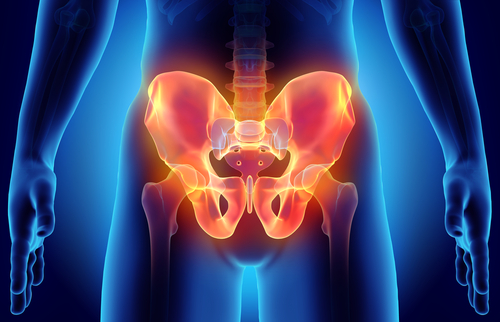Happy National Condom Week!
Are you suffering from recurrent pelvic inflammatory disease and/or chronic pelvic pain? Condoms may help reduce the risk.
Condoms are an effective barrier method of contraception (82% effective, according to the CDC) and reduce the spread of sexually transmitted diseases (STDs) including HIV, gonorrhea, and Chlamydia.
There are other benefits. Regular condom use with intercourse may also help the risk of recurrent Pelvic Inflammatory Disease (PID), Chronic Pelvic Pain (CPP), and Infertility. According to the 2004 study by Ness, Randall, Richter, et al., consistent condom users had 50% reduced risk for recurrence of PID, 30% reduced risk for chronic pelvic pain, and 60% reduced risk for infertility due to PID.
What is pelvic inflammatory disease (PID)?
Pelvic inflammatory disease is an infection-induced inflammation of the upper reproductive tract (the endometrium, fallopian tubes, ovaries, or pelvic peritoneum) of the female anatomy. In general, inflammation spreads from the vagina or cervix to the upper genital tract, endometritis is considered an intermediate stage of PID.
The way it presents can be different for different people. However, most clients with PID report pelvic tenderness and inflammation of the lower genital tract (vaginal canal, vaginal opening, and vulvar tissues).
PID is a concern because it can result in longterm reproductive issues, including infertility, ectopic pregnancy, and chronic pelvic pain.
What causes pelvic inflammatory disease (PID)?
PID occurs when certain bacteria, such as chlamydia or gonorrhea, move upward from a woman’s vagina or cervix into her reproductive organs. The most common bacteria are two sexually transmitted diseases (STDs), gonorrhea and Chlamydia. But, other types of bacteria that are usually found in the vagina may also cause PID.
Once you have had PID, you have a greater risk of getting it again. Again, condoms are a great way to reduce the risk of transmission of STDs, thereby reducing the risk of recurrent PID infection.
What are the signs and symptoms of pelvic inflammatory disease?
Pelvic inflammatory disease can present with a variety of symptoms that can range from subtle and mild to severe. When symptoms are present, the most common symptoms of PID are:
- Lower abdominal pain
- Mild pelvic pain
- Increased vaginal discharge
- Irregular menstrual bleeding
- Fever (>38° C)
- Pain with intercourse
- Painful and frequent urination
- Abdominal tenderness
- Pelvic organ tenderness
- Uterine tenderness
- Cervical motion tenderness
- Inflammation
Pelvic Floor Therapy and PID
If you have PID, Pelvic Floor Therapy can reduce the symptoms associated with the disease including pain with intercourse, pelvic pain, frequency of urination, and tenderness throughout the body. These treatments would begin after the active infection is cleared and may include:
- Dilator therapy to help with pain with penetration
- Exercises for pelvic muscles to lower pain, improve bladder retention, improve bowel function, and increase the flow of blood to the area
- Manual therapy to address tenderness and congestion in the abdomen, pelvis, and neck.
- Therapeutic yoga to improve lymphatic drainage and reduce chronic pain
- Neuromuscular re-education and autogenic relaxation to reduce chronic muscle over-activity, reduce pain, and improve sleep
Looking for help with recurrent pelvic inflammatory disease? Schedule an appointment with one of our therapists today!
Resources
Ness, R. B., Randall, H., Richter, H. E., Peipert, J. F., Montagno, A., Soper, D. E., … for the Pelvic Inflammatory Disease Evaluation and Clinical Health Study Investigators. (2004). Condom Use and the Risk of Recurrent Pelvic Inflammatory Disease, Chronic Pelvic Pain, or Infertility Following an Episode of Pelvic Inflammatory Disease. American Journal of Public Health, 94(8), 1327–1329.
Oakeschott, P, Kerry S, Aghaizu A, et al. Randomized controlled trial of screening for Chlamydia trachomatis to prevent pelvic inflammatory disease: the POPI (prevention of pelvic infection) trial. BMJ. 2010;340:c1642.
Scholes D, Stergachis A, Heidrich FE, et al. Prevention of pelvic inflammatory disease by screening for cervical chlamydial infection. N Engl J Med. 1996;334:1362–1366. 13.
World Health Organization (WHO) Department of Reproductive Health and Research, Johns Hopkins Bloomberg School of Public Health/Center for Communication Programs (CCP). Knowledge for health project. Family planning: a global handbook for providers (2011 update). Baltimore, MD; Geneva, Switzerland: CCP and WHO; 2011; and Trussell J. Contraceptive failure in the United States. Contraception 2011;83:397–404.
**This information is for educational purposes only and is not intended to replace the advice of your doctor.**

